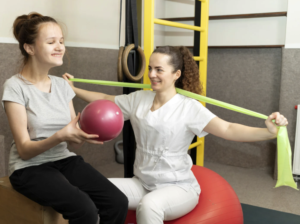Pretty much anything young kids need to learn, they can learn through play. According to Weisberg, Zosh, Hirsh-Pasek, and Michnick (2013), play helps children learn the connection between symbols and real objects, practice social skills, practice language, and discover new vocabulary and names for objects, all in a way that they enjoy. Parents who want to help their kids with their speech and language goals can often help most by just playing with them!
Read more to find out ways in which playtime can help your child’s speech and language development!
1. Toys your child is interested in
If you try to make your child play with a toy they don’t care about, you will both be bored. If you have toys your child likes, they will be more engaged, they will interact more with you, and you both will have more to talk about.
2. Toys that match your child’s developmental level
You may want to get challenging toys to try to improve your child’s skills, but if they don’t like them, then they may not be interested and may not benefit as much from the interaction. You never want to become frustrated by trying to force your child to do something, so if a toy is frustrating for you or your child, don’t use it. Find something recommended for your child’s age or developmental level and try that. For example, rattles and soft toys for babies; dolls, cars or kitchen sets for toddlers; or imaginative play sets for older children.
3. Toys that can be played together
Some toys don’t allow for very much interaction. For example, a game on the phone or ipad may be considered educational, but it doesn’t give kids or parents a chance to talk to each other, interact, or problem solve together. Some toys just turn on and off, but don’t do anything else. These aren’t the best because there may not be many chances for language. Instead, try games that need 2 people, or that can be enjoyed together, like catch, bubbles, play dough, or board games.
Most importantly, have fun!
References:
Weisberg, D. S.; Zosh, J. M., Hirsh-Pasek, K., Michnick, R. (2013). Talking it up: play, language development, and the role of adult support. American Journal of Play, 6(1), 39-54.
Wasik, B. A., Alice, M. (2001). Beyond the pages of a book: interactive book reading and language development in preschool classrooms. Journal of Educational Psychology, 93(2), 243-250.
If you or a loved one is in need of physical, occupational, or speech therapy call our front office at 586-323-2957 to schedule your FREE 30 minute screening
Written by: Kerry Symes, M.A., CF-SLP



